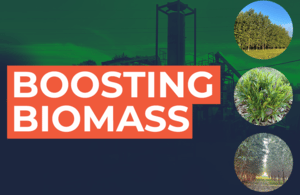Innovative biomass projects across the UK have today been awarded £37 million in funding.

- £32 million government funding to increase UK production of sustainable biomass, which can be used as a renewable energy source
- further £5 million to support innovative new technologies that will generate hydrogen from biomass and waste
- biomass can be used for low carbon energy, and will play a key role as the UK scales up renewables to end dependency on expensive fossil fuels
Innovative biomass projects across the UK have today (Thursday 4 August) been awarded £37 million in funding, as the government drives forward its plan to scale up domestic renewable energy, including from biomass.
Increasing the growth of elephant grass (miscanthus), farming seaweed off the North Yorkshire coast, and increasing the harvesting capacity for willow are among 12 projects receiving a share of £32 million funding under Phase 2 of the Biomass Feedstocks Innovation Programme, which aims to find new ways to increase biomass production in the UK.
Also announced today are 22 winners of the first stage of the Hydrogen BECCS programme, with £5 million funding to help develop innovative technologies to produce hydrogen, a clean fuel that emits only water vapour when combusted, from sustainable biomass and waste.
Biomass, a sustainable plant material, can be used to produce biofuels and sustainable aviation fuels, or to create chemicals for household cleaning products and bio-plastics. Biomass’ ability to deliver at scale has already been proven, having generated 12.6% of total UK electricity in 2020, forming an important part of our plans to generate more home-grown power and strengthen Britain’s energy security.
Energy Minister, Greg Hands, said:
Accelerating home-grown renewables like biomass is a key part of ending our dependency on expensive and volatile fossil fuels.
This £37 million of government investment will support innovation across the UK, boosting jobs whilst ensuring greater energy security for years to come.
Backed by the independent Climate Change Committee, biomass will form an important part of the UK’s future renewable energy mix, which will be vital for ensuring the UK’s energy security and reducing reliance on expensive fossil fuels.
Through Phase 2 of the Biomass Feedstocks Innovation Programme, projects will be developed from the design stage, which was supported with £4 million government funding, into full demonstration projects, showcasing new methods to grow sustainable biomass materials, which can be used to produce low-carbon energy. The projects will boost biomass productivity in the UK, through breeding, planting, cultivating and harvesting of organic energy materials.
Today’s winners include:
- Aberystwyth University, Wales, which is receiving over £2 million for their ‘Miscanspeed’ project, looking at accelerating the breeding of high-yielding, resilient miscanthus (elephant grass) – grass varieties that are well-suited for biomass use
- SeaGrown Limited in Scarborough, which is receiving over £2.8 million to develop new techniques to farm and harvest seaweed off the North Yorkshire coast, taking advantage of seaweed’s qualities as a source of biomass and its ability to remove carbon from the atmosphere
- Agri-Food and Biosciences Institute in Belfast, which is receiving over £1.5 million for their ‘EnviroCrops’ project, developing an app to enable farmers and land managers to make informed decisions about planting perennial energy crops, helping to optimise biomass choices for a given land area
The Hydrogen BECCS Innovation Programme supports the development of technologies to produce hydrogen generated via ‘BECCS’ (bioenergy with carbon capture and storage).
BECCS technology can uniquely offer the ability to remove carbon dioxide from the atmosphere, as the CO2 absorbed during the growth of the sustainable biomass and the organic content found in waste can then be permanently removed from the atmosphere using carbon capture technologies.
Hydrogen BECCS technologies will support the government’s plan to build a hydrogen economy, making hydrogen a clean fuel to use in hard-to-decarbonise sectors such as transport and heavy industry, while also removing greenhouse gases from the atmosphere.
This government backing for innovation in biomass production will help support the government’s plans to scale up and accelerate clean, renewable energy in the UK, to protect the UK’s domestic energy security. Supporting trailblazing hydrogen BECCS technology will help further the government’s ambition to see hydrogen as the clean super-fuel of the future, while also encouraging green investment into the UK and supporting the creation of new jobs.
The Hydrogen BECCS projects receiving funding today include:
- the University of Aberdeen, Scotland, which is receiving £220,239 to develop an innovative and sustainable process to obtain hydrogen from the organic matter present in different types of waste
- the University of Leeds which is receiving £249,984 for their H2-Boost project, which aims to produce biohydrogen for the UK transport sector
- 17Cicada Ltd in Stevenage which is receiving £237,065 to develop technology to produce hydrogen from bacteria
Stuart Fitzgerald, Managing Director of White Horse Energy said:
White Horse Energy are delighted to proceed into Phase 2 of the Biomass Feedstocks Innovation Programme with our mobile pelletisation innovation. Our technology is going to revolutionise the production of low carbon, domestically produced energy for the UK market, and we can’t wait to get started!
Kevin Chown, Chief Operating Officer at Kew Projects said:
BECCS systems producing hydrogen have huge potential for delivering commercially-viable greenhouse gas removal, whilst supporting the development of the hydrogen economy with low-cost hydrogen supply.
KEW have identified innovative approaches for the separation of the H2 product from the CO2 for sequestration, and the BEIS funding will be instrumental in enabling a more efficient and cost-effective process to be demonstrated and accelerate H2BECCS deployment.
Dr Paul Carver, CEO of New Energy Farms EU Ltd said:
The BEIS initiative is a key programme to assist UK climate change goals. New Energy Farms EU Ltd is very pleased to be able to contribute its efforts and technologies towards expanding UK biomass feedstock supply.
Paul Willacy, Managing Director of Compact Syngas Solutions said:
We are delighted to have been successful in obtaining government funding for our Hydrogen BECCS Innovation project. The ability to capture and store the carbon from our gasification process while making hydrogen, takes us one step closer to producing cleaner and greener hydrogen and to support the drive to net zero.
Notes to editors
The Biomass Feedstocks and Hydrogen BECCS Innovation Programmes are both funded through the BEIS £1 billion Net Zero Innovation Portfolio.
Biomass Feedstocks Innovation Programme
- The Biomass Feedstocks Innovation Programme aims to increase the production of sustainable UK biomass feedstocks
- Phase 2 builds on Phase 1, taking projects from the design stage through to the demonstration stage. This means Phase 2 was only open to applications from the projects that were supported under Phase 1
- see the list of all the successful Phase 2 winners
Hydrogen BECCS Innovation Programme
- The Hydrogen BECCS programme supports the development of core technologies essential for the generation of hydrogen from biomass and waste with the ability to capture carbon
- Phase 1 will be followed by a second phase, where the Phase 1 winners will be able to apply for further funding to support the demonstration of their hydrogen BECCS technology
- see the list of all the successful Phase 1 winners
Source : GOV.UK
